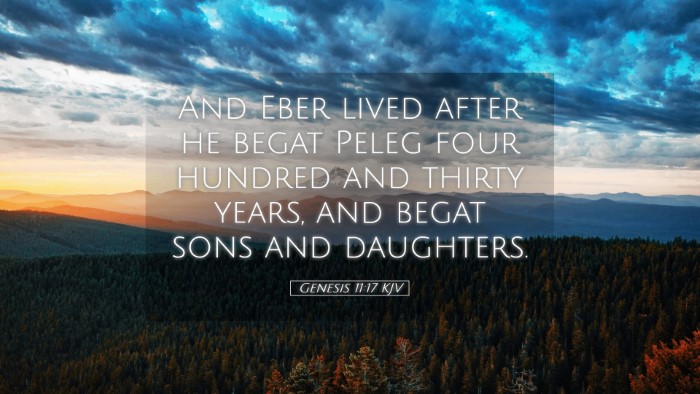Bible Commentary on Genesis 11:17
Verse Context: Genesis 11:17 states, "And Eber lived four and thirty years, and begat Peleg: and Eber lived after he begat Peleg four hundred and thirty years, and begat sons and daughters." This verse is situated within the genealogical records following the flood, showcasing the lineage leading to the patriarchs of Israel.
Genealogical Significance
Matthew Henry highlights the importance of genealogies in the biblical narrative, as they not only affirm God’s promises of heritage but also serve to connect the covenant community to its roots. Eber, as an ancestor of Abraham, plays a significant role, anchoring the narrative of salvation history.
Albert Barnes comments on the significance of names, particularly in a Hebrew context, where names often carry meaning reflective of character or circumstance. Eber’s name may be linked to the root meaning "to cross over," symbolizing a movement towards God’s promises and covenant purposes.
Peleg – The Divider
Adam Clarke offers insight into Peleg's name, which means "division" or "to divide." This can be seen as prophetic of the division of languages and nations described in the subsequent chapters. This name highlights God’s providence as humanity is scattered and differentiated, yet His sovereign plan continues through the descendants of Eber.
Timing of Birth and Lifespan
In this passage, the precise timing of Peleg’s birth (34 years after Eber’s birth) is noteworthy. Matthew Henry suggests that this detail underscores God's sovereignty over time and history. The mention of Eber's long lifespan serves as a reminder of God’s mercy and the original creation intent, where longevity was part of His design.
Theological Implications
Albert Barnes notes the theological implications surrounding the continuity and succession of God’s covenant people through generations. The mention of Eber's descendants illustrates the unfolding of God’s redemptive plan. Each generation plays a part in the greater story of God’s work among humanity.
Applications for Modern Readers
The genealogies, while sometimes seen as tedious, carry profound truths for contemporary believers. Adam Clarke emphasizes that understanding our spiritual lineage can strengthen our faith. Knowing we are part of a larger story invites us into our calling within God’s family.
- Reminding of Covenant Identity: Just as Eber was identified as a part of God’s plan, modern believers are called to recognize their identity in Christ and the community of faith.
- Appreciation of Heritage: This passage encourages the church to honor its heritage, understanding that history is important in preserving faith.
- Viewing History as God’s Story: The chronologies remind us that the unfolding of history is under divine control, encouraging trust in God’s providence amidst uncertainty.
Conclusion
Genesis 11:17, beyond a mere listing of names and years, invites deep theological reflection. The connections made by Matthew Henry, Albert Barnes, and Adam Clarke remind us of the divine purposes embedded within these verses. For pastors, theologians, and students of the Bible, these insights reinforce the beauty of God’s unfolding narrative, encouraging us to engage with Scripture’s richness.


